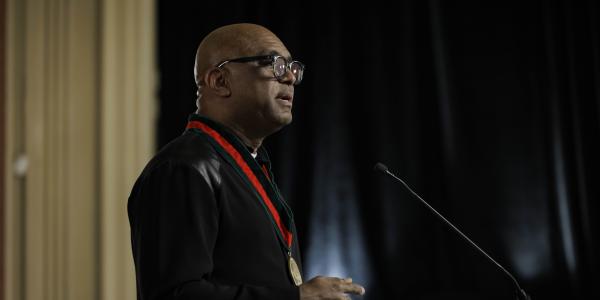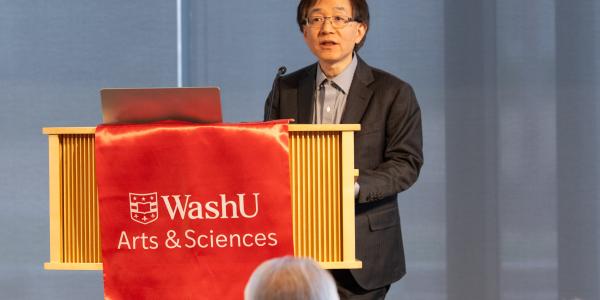Dwight A. McBride, the Gerald Early Distinguished Professor of African & African American Studies, delivered an address titled “Black Letters & Black Leadership, or 'What I Have Shaped into a Kind of Life.'”
On Dec. 10, Dwight A. McBride was installed as the Gerald Early Distinguished Professor of African & African American Studies in Arts & Sciences. The program included a welcome from Feng Sheng Hu, the Richard G. Engelsmann Dean of Arts & Sciences and Lucille P. Markey Distinguished Professor; remarks from Gerald Early, the Merle Kling Professor of Modern Letters; and the installation and medallion presentation by Chancellor Andrew Martin.

In his remarks, McBride discussed his upbringing in the small town of Belton, South Carolina, and his career as a scholar. “I’m a true believer in the power of higher education to change lives,” he said. “I’m living proof of that.”
McBride said that his resume of professional achievements masks a long struggle to find his place in academia. “While I was indeed the first African American in nearly all of the leadership roles that I entered, I was also the first openly gay person in those roles,” he said. As he rose through the ranks at various institutions, he had to ignore slights while working to ensure members of the majority felt comfortable. “I wonder what more I and others like me might have achieved if unburdened by those mostly invisible but time-consuming and emotionally depleting labors.”
Society actively creates barriers to prevent Black success, McBride said, but those obstacles can be overcome. “Black genius, Black excellence, Black achievement, and even Black joy all exist,” he said. “Every instance is a cause for celebration.”
About Dwight A. McBride
McBride is an accomplished academic leader, educator, and scholar with nearly three decades in higher education. He was president of The New School in New York City from 2020-2023. Prior to that, he served as provost and executive vice president for academic affairs at Emory University, where he was also Asa Griggs Candler Professor of African American Studies, Distinguished Affiliated Professor of English, and associated faculty in Women’s, Gender, and Sexuality Studies. At Northwestern University, he served as dean of the graduate school, associate provost for graduate education, and the Daniel Hale Williams Professor of African American Studies, English, and Performance Studies. He was also dean of the College of Liberal Arts & Sciences at the University of Illinois at Chicago (UIC); head and chair of the Department of African American Studies at UIC and Northwestern, respectively; and an assistant professor of English at the University of Pittsburgh.
McBride is a nationally recognized scholar of race and literary studies. He has published several books and essays on connections between race theory, Black studies, and identity politics. In 2022, he was elected to the American Academy of Arts & Sciences and is also a fellow of the American Antiquarian Society. McBride is co-founder and editor of the James Baldwin Review, and a founding co-editor of “The New Black Studies” book series at the University of Illinois Press.
He is a founding co-director of the Academic Leadership Institute, and he serves (or has served) on the boards of the Institute for International Education, the Dan David Prize, the Commission on Independent Colleges and Universities, A Better New York Foundation, Consolidated Edison, and the St. Louis Art Museum. He is a member of LGBTQ Presidents in Higher Education and of PEN America’s Champions of Higher Education.
A South Carolina native, McBride holds a bachelor’s degree from Princeton University and a master’s and doctoral degree from the University of California, Los Angeles.
About Gerald Early
Gerald Early is the Merle Kling Professor of Modern Letters in the Department of African and African-American Studies at WashU, where he has taught since 1982. Early recently served as interim director of the Center for the Study of Race, Ethnicity, & Equity. He previously served as the chair of the Department of African and African-American Studies, and director of the Center for the Humanities and the American Cultural Studies program. He is the executive editor of The Common Reader, WashU’s interdisciplinary journal.
Early is a noted essayist and American culture critic. His essay collections include “Tuxedo Junction: Essays on American Culture” (1989); “The Culture of Bruising: Essays on Prizefighting, Literature, and Modern American Culture,” which won the 1994 National Book Critics
Circle Award for Criticism; “This is Where I Came In: Essays on Black America in the 1960s” (2003); and, “A Level-Playing Field: African American Athletes and the Republic of Sports” (2011). He is also the author of “Daughters: On Family and Fatherhood” (1994).
His anthologies include “The Cambridge Companion to Boxing” (2019), “Approaches to Teaching Baraka’s Dutchman” (2018, with Matthew Calihman), “The Sammy Davis, Jr. Reader” (2001), “Miles Davis and American Culture” (2001), “The Muhammad Ali Reader” (1998), “Ain’t But a Place: An Anthology of African American Writings About St. Louis” (1998), and “Body Language: Writers on Sport” (1998). Early has served as a consultant on several Ken Burns documentary films, including “Baseball” (1994), “Jazz” (2001), “Unforgivable Blackness: The Rise and Fall of Jack Johnson” (2005), “The War” (2007), “The Roosevelts” (2014), and “Jackie Robinson” (2016).
Most recently, Early served as a curatorial consultant for the Baseball Hall of Fame’s new exhibit on Black baseball, “Souls of the Game,” which opened on Memorial Day weekend 2024. He also wrote a book to accompany the exhibit, slated for publication in spring 2025.
An elected fellow of the American Academy of Arts and Sciences and member of the American Philosophical Society, he was twice nominated for Grammy Awards and has been honored with a star on the St. Louis Walk of Fame.





